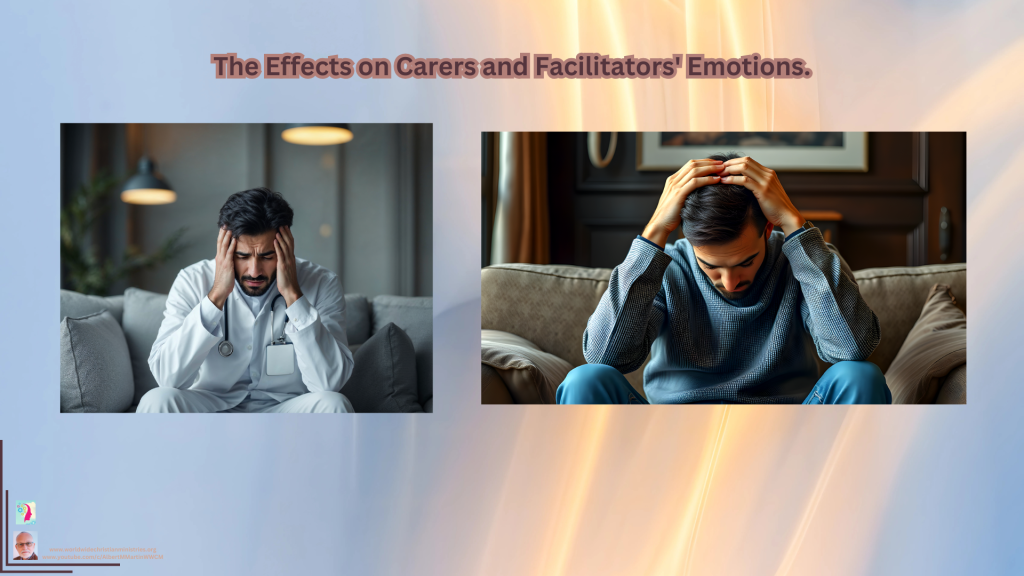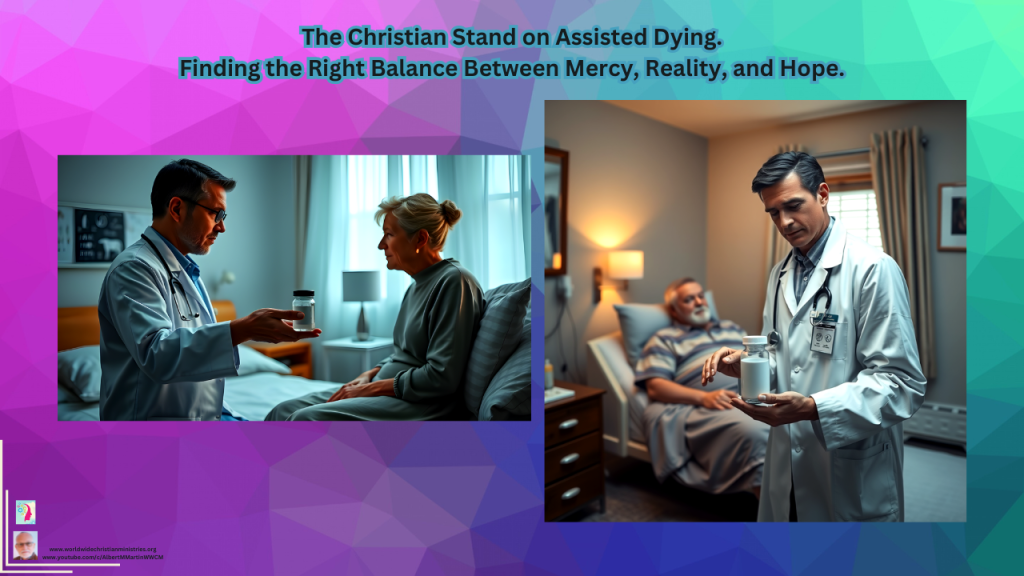The Christian Stand on Assisted Dying.
Finding the Right Balance Between Mercy, Reality, and Hope.
Introduction:
Assisted suicide is a complicated and sensitive subject that may make people feel many different things and see things from many different angles. Some people do it out of compassion, wanting to help those who are hurting. Some find it extremely problematic on a spiritual, ethical, and social level. It is imperative that we address this matter with candour, empathy, and biblical lucidity, regardless of our viewpoints.
By contrasting Christian empathy for the terminally ill with the inerrant teachings of Scripture, the article examines the issue of assisted suicide / killing/ euthanasia from a Christian point of view. It goes on to discuss the larger societal, individual, and caregiver-level effects of this issue.
Do the Scriptures and Morality Support Assisted Dying?
Life is holy, and no one has power over it save God, according to the Bible. The Bible tells us in Psalm 139:13–16 that God planned and orchestrated every detail of our lives. Likewise, Deuteronomy 32:39 declares that His sovereign hands have the power of life and death. Assisted suicide, whether instigated by the patient or by another else, undermines this sacred hierarchy.
When it says “You shall not murder” – Exodus 20:13, it encompasses suicide as well. Assisting someone in committing suicide is a morally and spiritually grave matter since, and has implications, for the individual, the family and the Doctor/ involved – at its core, suicide is self-murder.
Even when we are deeply hurting, Christians are commanded to trust God. In His lowest hour, Jesus demonstrated this confidence by saying, “Not my will, but yours be done” – Luke 22:42. In spite of its indisputable unpleasantness, trials and tribulations may work together for the good, strengthening our faith, drawing us closer to God, and testifying to His grace James 1:2-4; Romans 8:18. No amount of mercy should ever cause us to play a part that is rightfully God’s.
Does the Right to Die Affect the Afterlife?
A difficult and important subject is the question of everlasting repercussions for people who opt for assisted death. Faith in Jesus Christ secures one’s salvation, as stated in Ephesians 2:8-9. Grace from God, and not human deeds, decides it.
Choosing to terminate one’s life too soon, though, can show that one doesn’t believe in God’s sovereignty or doesn’t grasp His redeeming intentions in suffering. Even while God forbids deeds that originate in rebellion or despair, no one can say for sure what is going on in someone’s heart 1 Samuel 16:7.
Instead of passing judgement, Christians should offer pastoral care and hope. It is important to tell those who are struggling with thoughts of assisted suicide that God is with them always, that He loves them no matter what, and that He can bring them through any trial.
The Effects on Carers and Facilitators’ Emotions.

The emotional and mental burdens placed on individuals who aid in assisted dying are an underappreciated facet of the practice. Anyone involved in a person’s death, whether a doctor, a family member, or a legal counsel, might feel and should consider the profound spiritual and emotional effects.
Participating and complicity in someone’s death can cause deep emotional anguish, even when it seems like a compassionate or merciful deed at first. Even when people think they were acting compassionately, they may nonetheless feel guilty, regretful, or morally conflicted.
The emotional and spiritual toll on Christians caught up in these situations is immense. Complicity in the taking of a life goes against the biblical command to cherish and protect every human being. In order to make sense of their circumstances in light of God’s truth and grace, these people require encouragement, direction, and chances to reflect.
Is it Possible That Assisted Dying May Normalise Suicide?
Society runs the risk of creating a harmful precedent if it completely accepts assisted suicide. As euthanasia becomes more accepted, people may begin to view suicide as a valid option when faced with unbearable pain. This might lead to the establishment of formal programs like the National Health Service’s department for assisted dying. With resources being taken from “palliative care” departments in order to save on cost.
This change would probably lower the value of human life, making it less important than things like health, productivity, or social contribution under utilitarian valuations. Some vulnerable people, such as the elderly, the crippled, or those with chronic illnesses, may feel compelled to take their own life so they won’t be seen as a “burden.” This kind of thinking is completely at odds with the Christian ethic, which states that every person, no matter their situation, has worth and dignity.
What Impact Has the Watering Down of the Gospel Culturally Had?
Society has strayed from the gospel’s transformational power, and it shows in the growing acceptance of assisted suicide. With the rise of relativism, moral absolutes are being replaced, putting human liberty ahead of God’s ultimate plans and making the sanctity of life up for debate. Rather of focussing on the everlasting consequences of our decisions and the deeper truth of God’s sovereignty, the cultural narrative in this setting frequently emphasises individual comfort and the avoidance of pain.
The situation has unfortunately been worsened by the watering down of the gospel in many churches. The gospel is more than just reassuring words; it reveals God’s deep love absolutely. However, eternal judgement is a part of the gospel’s completeness Hebrews 9:27. People and the world have a distorted view of Christianity when churches skirt difficult topics like sin, repentance, hell, God’s justice and His ultimate seat of judgement.
The gospel is more than just a message of hope, and Christians should not be portrayed as living a “kumbaya” lifestyle centred around love, joy, and self-fulfilment. The Bible makes it quite plain that there will come a day when all people must face Christ at his judgement seat 2 Corinthians 5:10. Misrepresenting the faith and failing to prepare people for eternity, presenting Christianity without this sombre truth is unacceptable.
By ignoring these essential elements of the gospel, Christians and non-believers are unprepared to face complex moral dilemmas, such as assisted suicide. In addition, countless numbers will go into eternity unprepared and without any chance of a turn around. Furthermore, it skirts the issue of the eternal repercussions of decisions that go counter to God’s plan for humanity. Neglecting to mention the reality of everlasting accountability in a gospel message runs the danger of diverting people away from the salvation and hope that can be found in Christ alone.
The Christian life is not without its difficulties, but it is lived with the promise of everlasting glory, and churches may assist their members and those who are non-believers in understanding this by re-establishing the harmony between God’s love and justice. This whole gospel, which presents both God’s grace and His judgement, gives us a solid basis for dealing with the complicated moral issues of our day.
The Voice of the Gospel Revived.
In order to fight against the death culture, the Church must recover the entire gospel message. The fact that Jesus conquered sin and death gives us reason to have faith and persevere through adversity. While the gospel does not guarantee a life without suffering, it does promise that we will experience God’s peace, purpose, and presence no matter how bad things become.
Helping people find hope in compassionate treatment, emotional support, and strong biblical teaching are practical actions that may be taken to avoid aided suicide. The Church may provide a significant counternarrative to society’s false story by announcing the sacredness of human life and the atoning power of Christ.
In summary.
Despite the good intentions behind assisted suicide, it goes against the teachings of the Bible about the sacredness of human life and God’s absolute authority. It embodies the perils of a civilisation growing more and further from biblical truth, threatens everlasting views, and puts moral and emotional demands on carers.
A Christian’s role is to be an advocate for life, reassuring people that God’s grace is enough no matter what and providing them with hope and encouragement. As a lighthouse of love and truth, the Church must guide a lost world towards the One who has triumphed over death and life.

